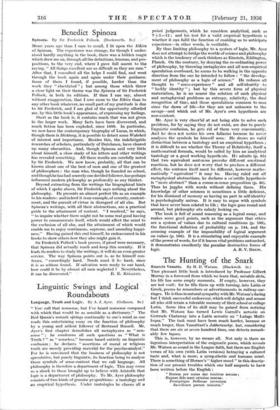Benedict Spinoza
Spinoza. By Sir Frederick Pollock. (Duckworth. 2e.) ..
Mona years ago than I care to recall, I lit upon the Ethics of Spinoza. The experience was strange, for though I under- stood hardly anything hi the book, there was a hidden magic which drew me on, through all the definitions, lemmas, and pro- positions, to the very end, where I gave full assent to the saying, " All things excellent are as difficult as they are rare." After that, I consulted all the helps I could find, and went through the book again and again under their guidance. Some of them I found, if possible, harder than the work they " elucidated " ; but among those which threw a clear light on' their theme was the Spinoza of Sir Frederick Pollock, in both its editions. If then I can say, almost without exaggeration, that I owe more to the Ethics than to any other book whatever, no small part of my gratitude is due to Sir Frederick, and I am glad of the opportunity afforded me, by this little book's appearance, of expressing my feelings.
Short as the book is, it contains much that was not given in the larger work. Many facts have been discovered, and much fiction has been exploded, since 1899. In particular, we now have the contemporary biography of Lucas, in which, though there is Dichtung, it is possible to detect some Wahrheit of interest and importance. Besides this, the indefatigable researches of scholars, particularly of Dutchmen, have cleared up many obscurities. And, though Spinoza said very-little about himself, a close study of his letters and other writings has revealed something. All these results are carefully noted by Sir Frederick. We now know, probably, all that can be known about one of the best of men and one of the greatest of philosophers : the man who, though he founded no school, and though he has had scarcely one decided follower, has perhaps influenced modem philosophy as profoundly as any thinker.
Beyond extracting from the writings the biographical hints of which I spoke above, Sir Frederick says nothing about the philosophy. He presents an almost perfect life as an example to his readers : and indeed it is an example, of serenity, content- ment, and the pursuit of virtue in disregard of all else. But Spinoza's writings, with all their abstractions, are a practical guide to the attainment of content. " I resolved," he says, " to inquire whether there might not be some real good having power to communicate itself, which would affect the mind to the exclusion of all else, and the attainment of which would enable me to enjoy continuous, supreme, and unending happi- ness." Having gained this end himself, he endeavoured in his books to show others how they also might gain it.
Sir Frederick Pollock's book proves, if proof were necessary, that Spinoza did actually reach and keep this serenity. If it leads its readers to study the writings, it will do an even greater service. The way Spinoza points out is, as he himself con- fesses, " exceedingly ;laud.' -Needs_ must it lre hard, since it is so seldom found. If salvation were ready to our hand, how could it be by almost all men neglected ? Nevertheless,














































 Previous page
Previous page